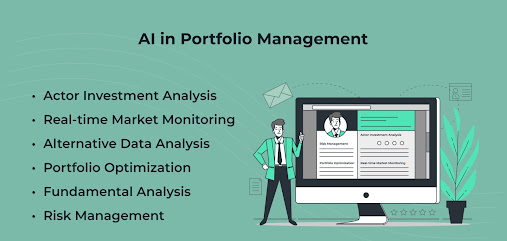AI in portfolio management
Elevating Portfolio Management: The AI Advantage
Introduction
In the dynamic landscape of investment management, the integration of Artificial Intelligence (AI) is ushering in a new era of efficiency, adaptability, and precision. AI's transformative impact on portfolio management is rewriting the rules, enabling asset managers to navigate the complexities of financial markets with unprecedented insights. This article delves into the significance of AI in portfolio management, exploring its key applications, benefits, and the paradigm shift it brings to the world of investments.
AI in Portfolio Management: A Revolutionary Paradigm
Traditional portfolio management relied heavily on historical data, statistical models, and expert judgment to make investment decisions. However, the fast-paced and complex nature of financial markets demands a more dynamic and data-driven approach. AI in portfolio management represents a paradigm shift by leveraging advanced algorithms, machine learning, and data analytics to enhance decision-making processes.
AI for Portfolio Management: Key Applications
1. Risk Assessment and Mitigation: AI excels in analyzing vast datasets to identify patterns and correlations. In portfolio management, AI algorithms assess various risk factors, market trends, and economic indicators to provide a comprehensive risk profile. This enables asset managers to proactively identify and mitigate potential risks, fostering a more resilient investment strategy.
2. Dynamic Asset Allocation: AI-driven models dynamically analyze market conditions, economic indicators, and asset performance to optimize portfolio allocations. These models adapt in real-time to changing market dynamics, ensuring that the portfolio remains aligned with investment goals and risk tolerance. Dynamic asset allocation enhances the efficiency of portfolios and maximizes returns.
3. Algorithmic Trading Strategies: AI algorithms are instrumental in developing and refining algorithmic trading strategies. By analyzing historical market data and identifying patterns, AI-driven models can optimize trading strategies to capitalize on market inefficiencies and trends. This approach contributes to more effective and adaptive trading decisions.
4. Behavioral Finance Integration: AI for portfolio management incorporates insights from behavioral finance. By analyzing investor behavior and sentiment, AI models provide a nuanced understanding of market dynamics. This behavioral insight helps asset managers make informed decisions, considering not just statistical models but also the psychological aspects of market participants.
5. Performance Analytics and Reporting: AI enhances the analysis of portfolio performance by providing in-depth analytics and real-time reporting. Asset managers can gain insights into the performance of individual assets, sectors, and the overall portfolio. This transparency enables more informed decision-making and communication with stakeholders.
Benefits of AI in Portfolio Management
1. Improved Decision Accuracy: AI algorithms process vast amounts of data with speed and precision, leading to more accurate investment decisions. By analyzing multiple factors simultaneously, AI enhances decision-making accuracy in portfolio management.
2. Adaptability to Market Dynamics: Financial markets are dynamic and subject to rapid changes. AI's ability to adapt in real-time to evolving market conditions ensures that portfolios remain resilient and responsive to emerging trends and risks.
3. Efficient Risk Management: AI enables more effective risk management by identifying and assessing potential risks across diverse factors. This proactive approach allows asset managers to implement risk mitigation strategies and protect portfolios from unforeseen events.
4. Enhanced Efficiency and Automation: AI automates routine tasks such as data analysis, portfolio rebalancing, and reporting, freeing up time for asset managers to focus on strategic decision-making. This efficiency contributes to a more streamlined and agile portfolio management process.
5. Optimized Asset Allocation: AI-driven models optimize asset allocation by considering a multitude of variables. This results in portfolios that are strategically aligned with investment objectives, risk tolerance, and market conditions.
Conclusion
AI's integration into portfolio management is reshaping the investment landscape by introducing unprecedented efficiency, adaptability, and precision. Asset managers leveraging AI-driven insights gain a competitive edge in navigating the complexities of financial markets. As the financial industry continues to embrace the transformative potential of AI, the synergy between human expertise and AI capabilities promises to redefine traditional portfolio management practices. In this evolving era, AI for portfolio management stands as a catalyst for innovation, offering a pathway to more informed, efficient, and strategic investment decisions.




Comments
Post a Comment